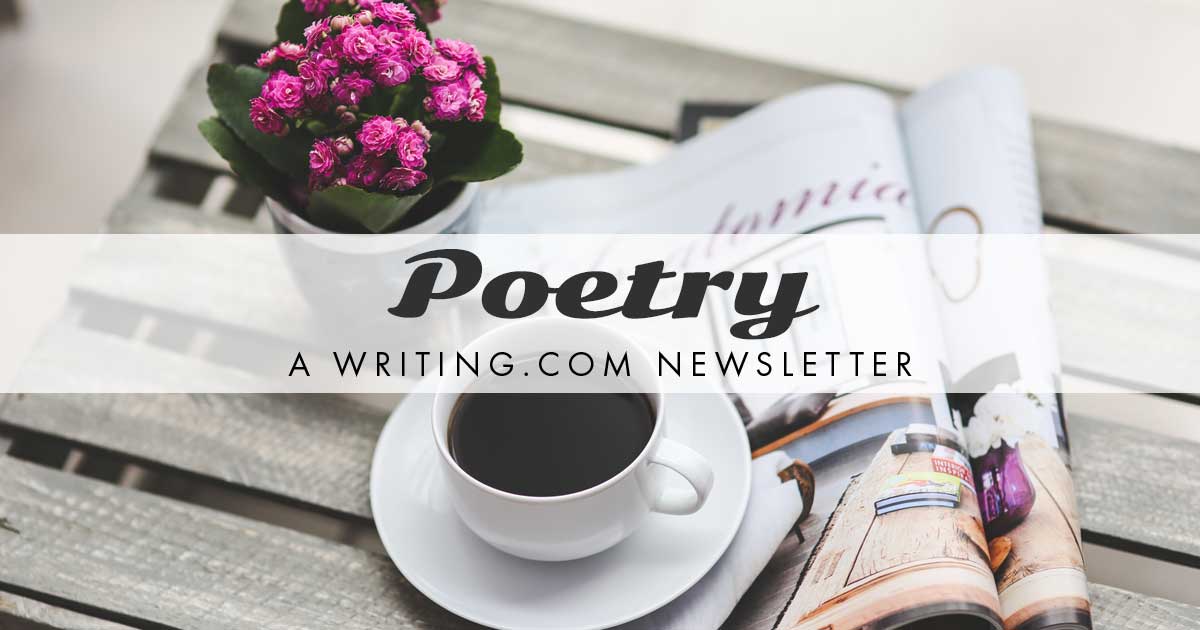This week: From the Heart Edited by: Lilli ☕ VACAY! back on 4/29  
More Newsletters By This Editor 
![Table of Contents [#401437]
Table of Contents](https://www.Writing.Com/main/trans.gif) ![Table of Contents [#401437]
Table of Contents Table of Contents](/main/images/action/display/ver/1709303267/item_id/401437.png)
1. About this Newsletter
2. A Word from our Sponsor
3. Letter from the Editor
4. Editor's Picks
5. A Word from Writing.Com
6. Ask & Answer
7. Removal instructions
![About This Newsletter [#401439]
About This Newsletter](https://www.Writing.Com/main/trans.gif) ![About This Newsletter [#401439]
About This Newsletter About This Newsletter](https://www.writing.com/main/images/action/display/ver/1709303676/item_id/401439.png)
Thoughts from Poets on poetry...
 "Poetry is nearer to vital truth than history." "Poetry is nearer to vital truth than history."
~ Plato
 "Poets are the sense, philosophers the intelligence of humanity." "Poets are the sense, philosophers the intelligence of humanity."
~ Samuel Beckett
 "Poetry is a deal of joy and pain and wonder, with a dash of the dictionary." "Poetry is a deal of joy and pain and wonder, with a dash of the dictionary."
~ Khalil Gibran
 "A poem begins as a lump in the throat, a sense of wrong, a homesickness, a lovesickness." "A poem begins as a lump in the throat, a sense of wrong, a homesickness, a lovesickness."
~ Robert Frost
|
![Letter from the editor [#401442]
Letter from the editor](https://www.Writing.Com/main/trans.gif) ![Letter from the editor [#401442]
Letter from the editor Letter from the editor](https://www.writing.com/main/images/action/display/ver/1709303784/item_id/401442.png)
Poetry is works that flow from our minds and hearts through our hands.
Between the death of Queen Elizabeth II on September 8th and the 21st Anniversary of 9/11, it has filled this past week with deep emotions for many across the world. Some may find it difficult to reconcile their feelings and find peace amidst the chaos. Reading and/or writing poetry can engage our senses along with our emotions and provide a pathway to peace and have therapeutic effects on the mind.
“Writing poetry requires us to be open and honest about our feelings so that we can voice them through pen and paper, which is the first step to truly expressing ourselves,” explains author Geri Giebel Chavis in Poetry and Story Therapy: The Healing Power of Creative Expression (Writing for Therapy or Personal Development).
Personally, I seem to write my best poetry when I am struggling with my emotions and seeking clarity. This is when the cathartic release of emotions to pen and paper as an outlet calms me, gives me some clarity, and enables me to move forward. Coincidentally, these are the poems I rarely share.
Poetry’s powerful healing qualities have been well documented during both World Wars and the American Civil War: they read poems to soldiers to help them cope with trauma and the brutalities of war. In fact, doctors would write poems for their patients, emotionally connecting with them. A striking example of this is poet John Keats who also trained as a doctor.
I will typically turn to poetry when dealing with confusing situations or when dealing with loss or pain. It has really helped me during difficult transitions in my life, such as dealing with illness, death of loved ones, disappointment, etc. Transforming difficult emotions into words can offer relief and the beginning of understanding.
Here are some suggestions to get you started writing a poem if you find yourself in need of a release.
 Name the emotion you are feeling and describe it in a four-line stanza Name the emotion you are feeling and describe it in a four-line stanza
 Talk about your fears Talk about your fears
 Talk about your losses Talk about your losses
 Talk about your dreams Talk about your dreams
 Focus on a powerful image and describe it Focus on a powerful image and describe it
 Write about what inspires you Write about what inspires you
If you feel that you struggle with writing poetry, try reading poetry. We are often drawn to a poem when we connect with the poet’s feelings, either feeling the same as the poet or empathizing with him/her. It feels like a 2-way dialogue, where there is a sense of mutual understanding. In How to Read a Poem…: and Start A Poetry Circle, Molly Peacock makes a great observation that readers often feel a poem is about them because it captures exactly how they are feeling. This has a profound, almost cathartic impact on the reader.
Wether you choose to read or write poetry, I wish you peace. |
![Editor's Picks [#401445]
Editor's Picks](https://www.Writing.Com/main/trans.gif) ![Editor's Picks [#401445]
Editor's Picks Editor's Picks](https://www.writing.com/main/images/action/display/ver/1709303830/item_id/401445.png)
| |  | Invalid Item 
This item number is not valid.
#2280078 by Not Available. |
| |  | Invalid Item 
This item number is not valid.
#2137067 by Not Available. |
| |  | Invalid Item 
This item number is not valid.
#300947 by Not Available. |
| |  | Invalid Item 
This item number is not valid.
#2279464 by Not Available. |
|
![Word From Writing.Com [#401447]
Word from Writing.Com](https://www.Writing.Com/main/trans.gif) ![Word From Writing.Com [#401447]
Word from Writing.Com Word from Writing.Com](https://www.writing.com/main/images/action/display/ver/1709303874/item_id/401447.png)
Have an opinion on what you've read here today? Then send the Editor feedback! Find an item that you think would be perfect for showcasing here? Submit it for consideration in the newsletter!
https://www.Writing.Com/go/nl_form
![Ask & Answer [#401448]
Ask & Answer](https://www.Writing.Com/main/trans.gif) ![Ask & Answer [#401448]
Ask & Answer Ask & Answer](https://www.writing.com/main/images/action/display/ver/1709303902/item_id/401448.png)
![Unsubscribe [#401452]
Removal Instructions](https://www.Writing.Com/main/trans.gif) ![Unsubscribe [#401452]
Removal Instructions Removal Instructions](https://www.writing.com/main/images/action/display/ver/1709303960/item_id/401452.png)
To stop receiving this newsletter, click here for your newsletter subscription list. Simply uncheck the box next to any newsletter(s) you wish to cancel and then click to "Submit Changes". You can edit your subscriptions at any time.
|
